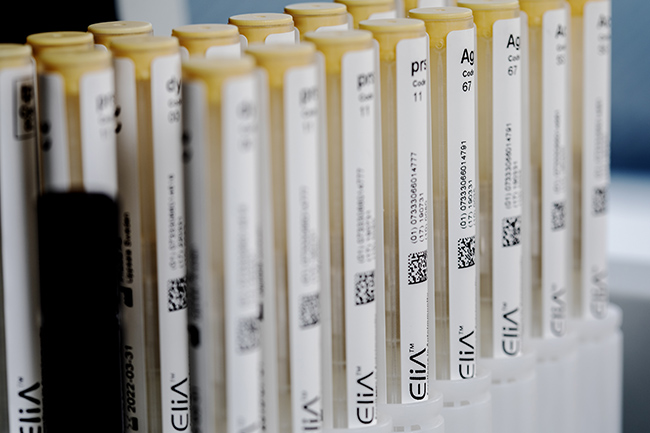It’s time to test for respiratory allergies
Is it the puppy or the pollen? Allergic or non-allergic rhinitis? Will antihistamines solve the problem? Use ImmunoCAPTM Specific IgE testing for suspected respiratory allergies to help identify specific allergens and enable targeted, effective treatment.
Find the most up-to-date, localized respiratory allergen profiles in our Lab Ordering Guide (LOG).
For patients, learn more about allergy symptoms, triggers and care at Allergy Insider.
4 reasons why you should test for respiratory allergies in primary care
1. Improve patients' quality of life
Don’t let allergic rhinitis symptoms stand in the way of your patients’ daily activities and well-being.


2. Achieve diagnostic clarity for targeted care
There’s symptom overlap between allergic and non-allergic rhinitis. Testing helps inform an effective management plan.
3. Leverage the value of a negative IgE result
There’s power in a negative result, too, which can indicate where additional investigation for allergy-like symptoms is required.


4. Elevate allergy management
Clinicians like you are patients’ first line of defense for effective allergy management to help give them answers.
Similar symptoms - different causes
Allergic rhinitis
- Itchy, runny nose
- Wheezing
- Sneezing
- Itchy, watery eyes
- Postnasal drip
- Coughing
Non-allergic rhinitis
- Itchy, runny nose
- Wheezing
- Sneezing
- Itchy, watery eyes
- Postnasal drip
- Coughing
- Can produce a fever
- Not likely to last more than two weeks
- Sore throats can accompany colds
- Appear during any season of the year
If your patient has allergic rhinitis symptoms, you should test
Allergy symptoms may seem mild, but they can profoundly impact patients’ quality of life. Testing helps identify the specific allergen triggers behind these symptoms, allowing you to provide targeted guidance and improve patient well-being. Take the guesswork out of allergy diagnosis so you can offer treatments that enhance your patients’ quality of life.
ImmunoCAP blood testing can help provide answers to make an informed diagnosis that improves outcomes for patients, including:
The ImmunoCAP testing portfolio is the gold standard in allergy diagnostics4
Drive precise results with our ImmunoCAP portfolio comprised of more than 550 whole allergens, allergen mixes and allergen component tests. Backed by 50+ years of research, ImmunoCAP tests can help optimize patient management, from rhinitis and asthma to immunotherapy guidance. Available through leading labs worldwide, the comprehensive ImmunoCAP test portfolio is trusted for accurate diagnosis across diverse patient needs.5,6
How do I order an ImmunoCAP test for my patient?
Ordering is quick and easy
First, identify the appropriate patient—one who is experiencing symptoms of allergic-like symptoms or has a history of symptoms such as nasal congestion, rhinorrhea, sneezing, coughing, wheezing, chest tightness and/or shortness of breath.
Now, it's time to test.
Allergens can vary significantly across the country. Regional respiratory profiles target common indoor allergens as well as regionally specific outdoor environmental allergens, allowing for more personalized testing and management. Search for the most relevant, up-to-date specific IgE test codes in the Lab Ordering Guide.

How to interpret your patient’s lab results
Combine ImmunoCAP Specific IgE blood test results with the patient's history, symptoms, and physical exam findings to inform your understanding and decision-making.4,5
What should you do with a positive result? How about a negative result for a specific allergen? Use this respiratory results interpretation guide to help you confidently understand the results, as well as potential clinical implications to aid in your diagnosis and patient management plan.
Resources for your primary care practice
Download our helpful guides and resources on respiratory allergies.





What’s inside our guides
Discover clear, step-by-step information to help you identify, test and manage respiratory allergies effectively. Each guide offers practical insights and resources tailored for healthcare professionals.
Discover more about allergy triggers
Uncover key insights into managing allergies, from identifying specific triggers like dust and dander to effective treatment options.
- Szeinbach, S. L. et al. (2004). Identification of allergic disease among users of antihistamines. Journal of Managed Care Pharmacy, 10(3), 234–238.
- Demoly, P. et al. (2022). A pragmatic primary practice approach to using specific IgE in allergy testing in asthma diagnosis, management, and referral. Journal of Asthma and Allergy, 15, 1069–1080.
- Welsh, N. et al. (2006). The pharmacoeconomic impact of ImmunoCAP testing on the usage of second-generation antihistamines and a leukotriene receptor antagonist at Wilford Hall Medical Center. Journal of the American Pharmacists Association, 46(5), 627.
- Crameri, R. (2013). The crux with a reliable in vitro and in vivo diagnosis of allergy. Allergy, 68(6), 693–694.
- Thermo Fisher Scientific. (2022, June 2). ImmunoCAP™ Specific IgE Conjugate 400 directions for use [Data sheet].
- Wang, J. et al. (2008). Correlation of serum allergy (IgE) tests performed by different assay systems. Journal of Allergy and Clinical Immunology, 121(5), 1219–1224.






